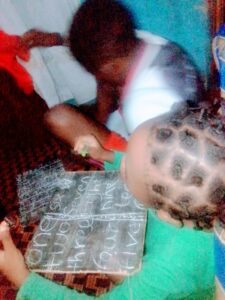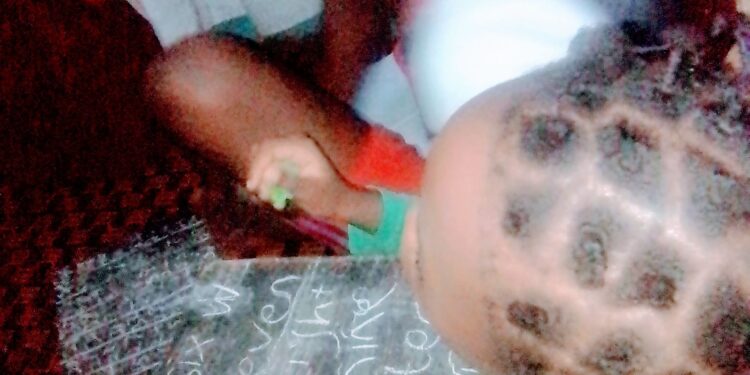From a purely medical perspective, early evidence suggest that children are not the most affected directly by COVID-19, but they do not stand on equal footing when it comes to coping with the economic and social effects of the pandemic.
The Coronavirus pandemic and it’s associated responses put in place by the government of Cameroon in March 2020, touched on almost every part of children’s worlds.
In this write up, we shall lay emphasis on how COVID-19 did impact on the health and education of some Internally Displaced Kids in Cameroon.
Bridiane had only spent three months in Yaounde with her six weeks old baby when the government on the 17 of March 2020 announced a national response plan to the pandemic.
Running away from the crisis in the Anglophone Regions, and living with her school mate, she had succeeded in securing a job as house help from where she gets some money to buy food and drugs for her sick child.
With the government’s response plan against COVID-19, her boss could no more entertain strangers in his house for fear of contamination, consequently she lost the job, and the impact was inevitable on the child.
“My child took ill days after I lost my job, life became difficult for us, even my classmate who was waiter in a bar lost her job too, I had no option than to plead with my aunt in Douala to help me take care of my child as her illness was degenerating. That is how I seperated with little Kiki, my princess” she told this reporter.
Like little Kiki, the Coronavirus pandemic greatly affected children indirectly especially the underprivileged.
One of the setbacks of government’s response plan was the shutting down of schools across the country.
It did not only impact negatively on the education of the children but also on their social life.
Niba Sharlotte, is a single parent, mother of two kids. She is the loan bread provider of the family selling roasted plantains and plum in the Biyem Assi neighborhood in Yaounde. With the crisis in Bafut, her native village, she is host to 4 more children who came in to continue their education in Yaounde.
COVID-19 came, business dropped and Life became difficult. Sharlotte saw the school closure as an opportunity to increase the source of her income. That is how the kids were introduced into hawking around town.
Talking to News Upfront, the elder daughter, 14 years old Cyndi, recounts their daily activities which have drastically changed because of the effects of COVID-19.
“Things are hard for mummy, that is why we are going out to sell every day to help the family” she said adding that;
“We get up very early in the morning by 4, start doing our house chores because we need to go to the market and buy what we will sell for the day. We sell almost everywhere in town, there are days we leave Biyem Assi to Ekounou and back on foot selling”
News Upfront gathered that there are days that the children will sell from morning till 8:00 PM.
Two of them were in examination classes, and the hawking business occupied them all day to the extent that they were not able to follow up with the online and TV classes organized by the government of Cameroon.
[… in tears] “I did my best but the results were not favourable, I don’t regret anyhow because I know if I didn’t go out to hawk, there wouldn’t have been anything in the house to eat as my aunty’s business was not moving as before” News Upfront gathered from one of the children.

Niba Sharlotte told News Upfront she is guilty of the failure, because she asked the kids to go out but it was just the only option she had to secure their health and well-being.
“The children are all victims of the effects of COVID-19, but I preferred their well-being to their education, I don’t know if it was the best choice to take, … they will definitely have another opportunity to take on their exams and be successful” she said.
Statistics from UNICEF indicated that 34 percent of school children worldwide (Cameroon inclusive) could not be reached by broadcast and internet based remote learning policies during the period of school closure.
3 out of 4 who could not be reached came from rural areas where such services are rare, or from poverty hit households.
These challenges were visible in Cameroon, and led to a good number of children cut off from studies for months before the resumption of the 2020/2021 academic year.
The first evaluation of school children in the 2020/2021 academic year in some Cameroonian institutions indicates that children have dropped academically, and the effects of COVID-19 are blamed to be responsible.
A good number of factors contributed to this appalling situation.
In households, little was done to keep the learning process on.
News Upfront met with another parent in Yaounde who said the safety of their children was their priority.
“We had to even stop the house teacher of our children from coming home to teach them because we never knew from which end COVID-19 could pass to enter the family” Mr Monju Cletus said, adding that;
“The only option we had was CRTV, but as we were busy trying to fend for the family, no confident person was home to remind the children on when TV lecture will be broadcast, and let me remind you that the new learning policy was not heavily publicized”
Other families in other areas in Cameroon could not continue the learning process for different reasons.
“I am in Sabongari, a remote village in the North West region, where access to CRTV is a big issue, we could not do otherwise, by the way schools are not operating in our village since the Anglophone crisis went violent in 2017, before COVID-19, our children have been out of school for years” a parent confirmed to News Upfront.
The broadcast policy it should be noted was not extended to private and Community media organs across the country, reasons for its limitations according to critics.
Haven spent months out of school, some children were even promoted to higher classes without complete knowledge of the previous class, and that explains the poor results recorded this first semester evaluation among school children.
The Head Teacher of a private school in the town of Yaounde, James Atemku, who accepted to talk to News Upfront was specific in his declarations.
“Since I became head teacher here, results of this year’s first semester evaluation tests are the worst and I have a strong feeling that it is as a result of the Coronavirus pandemic” Mr Atemku said.
In the classroom, the challenges are also evident.
“Contrary to last year, most of the Pupils in my class this year do not have the basic text books and even the appropriate exercise books for studies, and it is making the learning process difficult” a primary 3 teacher revealed to News Upfront.
“When we try to find out from parents, most tell us that Coronavirus has affected their businesses and things are tough financially to the extent that even registration for the children has not been completed in some cases” she continued.








